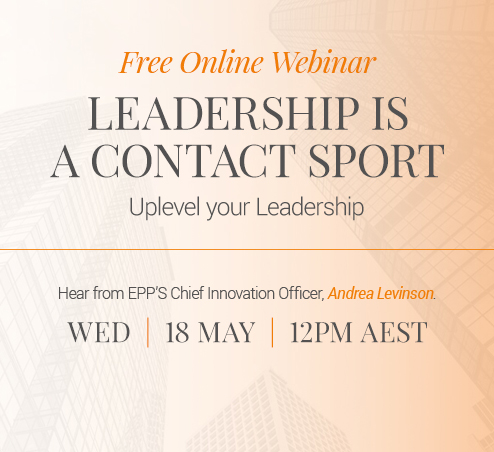Executive coaching is dead – let’s give it a proper farewell
By David Munro, CEO of Executive Performance Partners
We’re gathered here today to deliver the last rites to executive coaching as we know it.
A full interment might be a little premature, but in the modern world of business leadership, executive coaching as we know it is no longer enough.
We need to move beyond the traditional coaching method because while it’s a great starting point it’s not where it needs to be to respond and guide leaders to move the needle from good to great in a modern and ever-changing business world.
Why is the current model broken?
Coaching is much like the x-ray phase of a procedure. It’s an effective tool to find out where a leader is at, understanding their current skill gaps and exploring a sense of self-awareness.
But like any medical procedure, the x-ray is the starting point, it doesn’t get the job done in terms of taking the individual to a fully developed and healed patient at the end of the process.
Business coaching that’s purely developmentally focused doesn’t have a long shelf life left. When you’ve got knowledge gaps or an individual has simply run out of time or information to solve a problem, questions alone, which stems from traditional coaching, are no longer enough.
Yes, traditional executive coaching is an exceptional starting point, but it stopped at the bounds of exploration and didn’t move into the critical elements around problem solving and advice.
Gather around for story time
Here’s an analogy to help unpack this a little more. Leadership is a lot like parenting. Sometimes, it helps to sit down quietly and talk with the individual.
Sometimes this works, but other times you just want someone to help you with the answer. Sometimes you just need someone to give you direction and advise you what action steps to take because if you are asking for help, it’s because you don’t know the answer yet.
Leaders therefore need to move into a more solution-based approach particularly when things are time bound or challenging.
This executive coaching, in isolation, is dead.
Time for change
Today, our organisations are a hive of activity but not in the fortunate sense. Regrettably, staff turnover is high due to missed opportunities and career stagnation while reports have shown staff who aren’t engaged in their roles have left jobs in the hope of better job conditions or simply wanting a change.
Then of course we had COVID. The global pandemic presented us with a whole new set of challenges and forced organisations to think outside the box.
If there was one silver lining that resulted from COVID it was that it gave businesses, the opening to reinvent themselves.
The time has come for us to reset; it’s time to recalibrate because a one size fits all approach to coaching won’t cut it in today’s fast-paced and evolving business landscape.
Let’s meet the new model
Modern leaders need concrete answers and outcomes, and this is where a new approach for executive coaching, which focuses on the science of sustainable leadership habits comes into play.
If we are going to take someone on a leadership journey and turn them from good to great, then coaching must be looked at more broadly. It’s part of the process but other levels must be considered such as leadership skill development, mentoring, problem solving and the accountability lens.
We need to apply these tools and purposefully build behaviours, habits and ways of working that generate tangible results to deliver sustainable outcomes well into the future.
These behaviours then need to be repeated and ingrained into habit so that when the proverbial hits the fan you know exactly how to manage it.
When you build good habits as a leader, there will be profound ripple effects to your team.
Correspondingly, you’ll build motivation, excitement and open new ideas and opportunities building healthy, happy workplaces – the key to long-term success of organisations.
As optimist and author Simon Sinek eloquently states: ‘A culture is not invented. A culture constantly evolves, which is why it must be nurtured’.
For one of our clients, applying this solutions-based approach increased his confidence as a leader, enhanced the skill set of his staff, taught him to think objectively and not let emotions get in the way of his decision making and even improved his communication skills.
Further to this, as entrepreneur John Singleton succinctly said, which we have adapted to our leadership program, ‘the art of leadership is to take the complex and make it simple and to take the
simple and make it compelling’.
Effectively, the intent of this new approach is to see organisations and its leaders achieve their best and stay there.
Once you can identify where your organisation is heading to and where you’re starting from, the pathway to change management can be supported effectively.
Where to from here?
If we are going to stay relevant in current times, then we need to shift the goal posts.
Rather than coaching from the sidelines, let’s amplify our skills and take coaching to the level where it was always intended to be.
Let’s be on the offense kicking goals rather than the defence.
In order to do this successfully and help executives go from good to great, we need to stop being a professional services solution and start being a business outcomes and performance-led partner.
The days of Executive Coaching (centred on developmental focus, traditional coaching techniques and expensive hourly rates) are now dead.
Let’s rise from the ashes and deliver:
1. Performance not just development – real business results not just participant satisfaction
2. Leadership habits not just coaching – sustainable habits that help leaders grow in a way that takes their performance from good to great rather than just being a sounding board with questions not answers
3. Outcomes not just hours – like other industries (think recruitment) we must back ourselves and guarantee results as a partner and not just bill for hours with an “all care, no responsibility attitude”
This is where we need to keep a scoreboard on performance to ensure improvements in productivity, efficiency, sales, profitability, growth and leadership outcomes are met consistently. It’s the goal for success.
If we are truly going to shift our approach to executive coaching, then we must make a conscious effort to let go and put to rest traditional coaching methods.
ENDS
For more than 20 years, David Munro has worked alongside more than 5,000 of the nation’s top executives, leaders, board members and owners across all sectors. Based on his learnings, the registered psychologist explains why Executive Coaching is dead and sustainable leadership and habits are the way of the future.


